Dr. Lloyd Johnson has a passionate interest in peace with justice in the Holy Land. He is the guest writer today to introduce his novel, “Living Stones,” which touches on this theme and will be available this summer. He writes:
“Ann Gaylia O’Barr, published author of five books and with experience in the Middle East, invited me to write as a guest. I’m honored since we share a common interest in the Holy Land today.
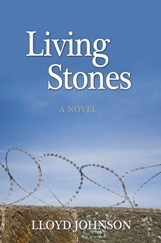 “Living Stones” being published by Koehler, a fiction imprint of Morgan James Publishers of New York, will be available in June as an e-book, and paperback in September 2013. Briefly it’s the story of a beautiful graduate student Ashley Wells who is the victim of a jihadist bombing and is abducted in Jerusalem. She falls in love with a Christian Palestinian and is torn by her Zionist beliefs and her new desire to help the Palestinian cause
“Living Stones” being published by Koehler, a fiction imprint of Morgan James Publishers of New York, will be available in June as an e-book, and paperback in September 2013. Briefly it’s the story of a beautiful graduate student Ashley Wells who is the victim of a jihadist bombing and is abducted in Jerusalem. She falls in love with a Christian Palestinian and is torn by her Zionist beliefs and her new desire to help the Palestinian cause
She was in the wrong place at the wrong time. Nearly killed in Seattle during a jihadist bombing, Ashley recognizes the synagogue bomber and is later stalked by a hired Muslim hit man in Israel. There she visits the home of Najid, the Christian Palestinian scholar she had left behind at the University of Washington. She falls in love with him, putting her at odds with her Zionist pro-Israeli convictions.
On the run, Ashley sees the beautiful rock churches and shrines. But the living stones, the people of the Holy Land intrigue her. She meets Jews and Palestinians, Rabbis for and against Israeli settlement expansion. Gentle Palestinians like Najid’s family, and those in the West Bank suffering under military occupation. Both Muslims and Christians living peacefully together.
Najid and Ashley find the bomber in Seattle despite the FBI dragnet put out to arrest him. Living Stones is the story of an American woman coming to terms with the truth of the Middle East, and the lies she had been fed. Will she survive the forces that threaten to tear her apart?
Visiting Israel/Palestine twice in past years, and living in Bethlehem this past summer, our hearts broke with the stories of ordinary people suffering the lack of freedom under Israeli military occupation. For 46 years. Imprisonment of kids for long periods, walls separating Palestinians from each other, even from their own farms. Home demolitions, land evictions. Israeli settlers continuing to displace local residents of family land dating back decades. A historic and on-going national effort to cleanse Palestine of Arab citizens. It’s the idea that one ethnic group has the exclusive right to the Holy Land. The “others” must go.
Many Jewish groups of conscience actively oppose the Israeli government’s Zionist ambitions. E.g., http://jewishvoiceforpeace.org/ This cruelty does not represent Judaism’s welcoming the strangers as Abraham did, nor the Good Samaritan teachings of Jesus about loving even our enemies, and doing to others as we would have them do to us.
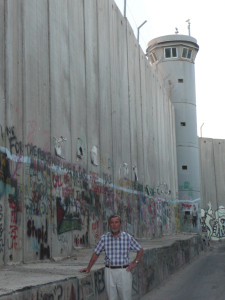 That wall of separation larger and longer than the Berlin wall promotes the same apartheid we finally shed in the American South, and condemned in South Africa. But now our American tax dollars enable it by funding this injustice. Is this what we in the U.S. really want to do?
That wall of separation larger and longer than the Berlin wall promotes the same apartheid we finally shed in the American South, and condemned in South Africa. But now our American tax dollars enable it by funding this injustice. Is this what we in the U.S. really want to do?
Our Christian Palestinian brothers and sisters realize most of us Americans know little of their suffering under military occupation as second-class citizens. Although many excellent books currently available tell their stories, they are non-fiction accounts, often overlooked by all but the most interested readers. (However, “Lemon Tree” by Sandy Tolan has become popular in America, a true story. And Jimmy Carter’s “Palestine: Peace Not Apartheid.”)
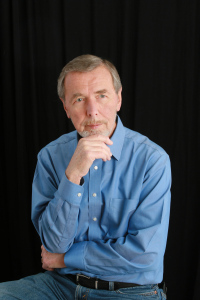 Fiction appeals to many. Who doesn’t like a good story with lots of adventure and a bit of romance? So I am offering “Living Stones” as a story that will entertain, but also inform and leave readers questioning what they have always believed. It may become another voice for peace with justice in the Holy Land. At least I hope so.”
Fiction appeals to many. Who doesn’t like a good story with lots of adventure and a bit of romance? So I am offering “Living Stones” as a story that will entertain, but also inform and leave readers questioning what they have always believed. It may become another voice for peace with justice in the Holy Land. At least I hope so.”
www.lloydjohnson.org
http://www.koehlerbooks.com/books/living-stones/


 On April 18, 1983, fifty-two employees died when a terrorist drove an explosive-laden truck into the U.S. embassy in Beirut, Lebanon. These included Americans and Lebanese. Other innocent civilians were killed as they visited the embassy or walked by on a beautiful spring day. More than one-hundred employees were injured.
On April 18, 1983, fifty-two employees died when a terrorist drove an explosive-laden truck into the U.S. embassy in Beirut, Lebanon. These included Americans and Lebanese. Other innocent civilians were killed as they visited the embassy or walked by on a beautiful spring day. More than one-hundred employees were injured.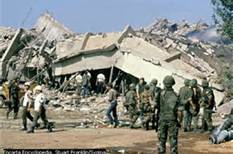 Between those attacks, terrorists blew up a U.S. Marine Corps barracks near the Beirut airport, killing 221 Marines and other servicemen.
Between those attacks, terrorists blew up a U.S. Marine Corps barracks near the Beirut airport, killing 221 Marines and other servicemen.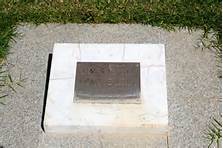 Their names were carved on a small memorial at the Tunis embassy.When terrorists attacked that embassy last year, the memorial was vandalized. This year it was rededicated on the anniversary of the Beirut attack in which they died thirty years before. When I worked in Tunis, I passed it every day, a reminder of the sacrifice of ordinary people.
Their names were carved on a small memorial at the Tunis embassy.When terrorists attacked that embassy last year, the memorial was vandalized. This year it was rededicated on the anniversary of the Beirut attack in which they died thirty years before. When I worked in Tunis, I passed it every day, a reminder of the sacrifice of ordinary people.



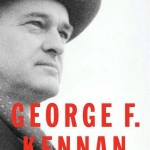

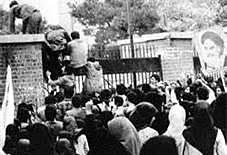
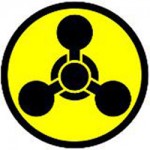 The issue of chemical weapons hovers over the conflict. Bashar al-Assad has chemical weapons and has threatened to use them. No one doubts the brutality of the al-Assad famly. The father of Bashar massacred and obliterated the village of Hama in 1982 because of its opposition to his rule.
The issue of chemical weapons hovers over the conflict. Bashar al-Assad has chemical weapons and has threatened to use them. No one doubts the brutality of the al-Assad famly. The father of Bashar massacred and obliterated the village of Hama in 1982 because of its opposition to his rule.
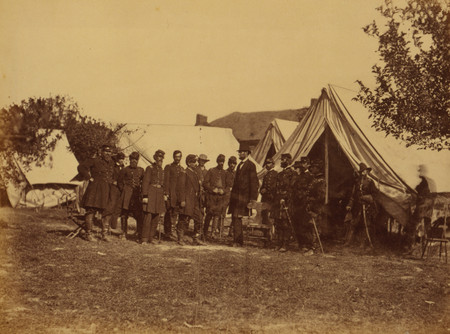 Otherwise reasonable people became too angry to discuss differences. Southerners cared more for their cotton economy and its slave labor than in justice. The North knew its own exploitation of immigrant labor, yet often saw itself as superior and worked from a position of self-righteousness in dealing with the slavery issue.
Otherwise reasonable people became too angry to discuss differences. Southerners cared more for their cotton economy and its slave labor than in justice. The North knew its own exploitation of immigrant labor, yet often saw itself as superior and worked from a position of self-righteousness in dealing with the slavery issue.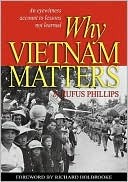 He spent his first diplomatic postings in the 1960’s in that country, taking part in efforts to “win the hearts and minds” of the Vietnamese. He saw those efforts fail, and disillusionment followed as he realized that American power, great as it is, has limits.
He spent his first diplomatic postings in the 1960’s in that country, taking part in efforts to “win the hearts and minds” of the Vietnamese. He saw those efforts fail, and disillusionment followed as he realized that American power, great as it is, has limits.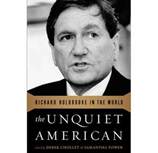
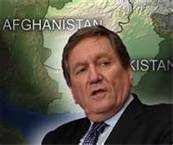 Holbrooke died suddenly in the middle of his diplomatic mission in another war, this one in Afghanistan. He saw differences with Vietnam, including the fact that America had been deliberately attacked by enemies with bases in Afghanistan. However, he also detected similarities with the quagmire that became Vietnam: ” . . . the existence of an indefensible border harboring enemy sanctuaries; American reliance on a corrupt partner government; and, most critically, the embrace of a counterinsurgency doctrine, which he had learned through painful experience was an exceedingly difficult military and civilian strategy to execute.” (The Unquiet American, page 95.)
Holbrooke died suddenly in the middle of his diplomatic mission in another war, this one in Afghanistan. He saw differences with Vietnam, including the fact that America had been deliberately attacked by enemies with bases in Afghanistan. However, he also detected similarities with the quagmire that became Vietnam: ” . . . the existence of an indefensible border harboring enemy sanctuaries; American reliance on a corrupt partner government; and, most critically, the embrace of a counterinsurgency doctrine, which he had learned through painful experience was an exceedingly difficult military and civilian strategy to execute.” (The Unquiet American, page 95.)